Plums are very delicious fruits filled with vitamins and nutrients. They're a great summer snack and a wonderful addition to many dishes, such as pies, cakes, and even roasted meats.
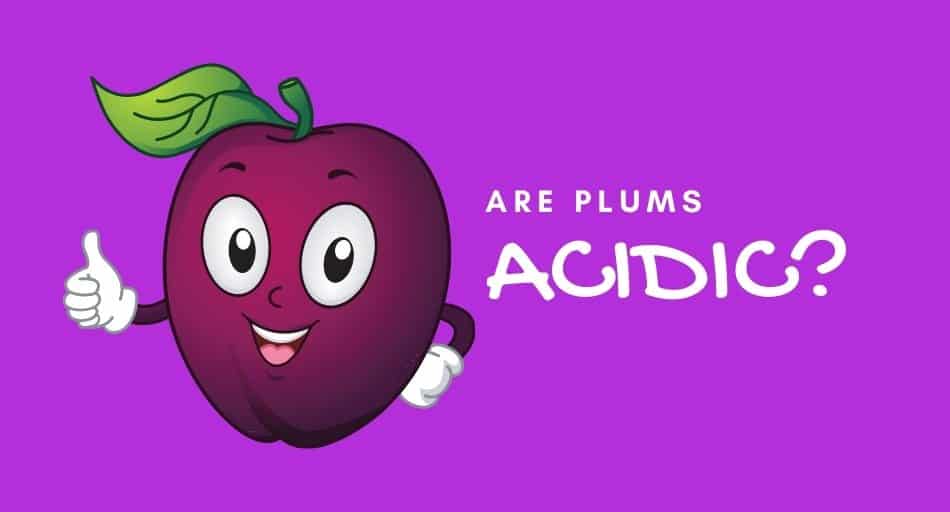
However, if you've ever eaten a plum (like most of us have), you know that they have a rather sour taste.
So, are plums acidic? Should everyone include them in their diets?
Table of Contents
Are Plums Acidic?
Plums are acidic fruits, leaning towards the lower pH level spectrum. Even though plums alkalize in the body, their initial acidity causes an increase in acid production. This can worsen GERD and acid reflux symptoms, so many doctors don't recommend plums for people struggling with such stomach issues.
Plums can also cause indigestions issues due to their sour taste.
What is the pH level of plums?
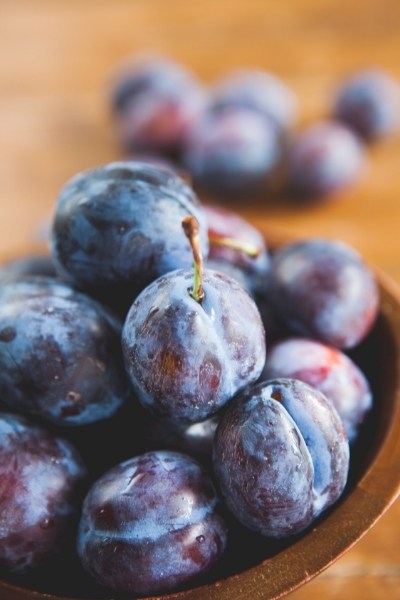
The pH level of plums ranges between 2.8-4.3 depending on the plum variety. They're very acidic, which can be tasted since their sugar content doesn't fully mask their acidity.
Foods below the pH of 4.6 are considered acidic, so plums are definitely the type of fruit that should be avoided by people struggling with GERD, acid reflux, heartburn, and even indigestion.
How healthy are plums?
Even though plums are very acidic, they have lots of health benefits. Drinking prune juice and eating plums have been linked to a lower rate of heart disease.
Thanks to a high level of antioxidants and various minerals, this fruit in both its forms helps protect the heart and strengthen heart muscles.
Plums are an easy fruit to add to any diet since you can eat them as a snack, in pies, and in many other forms. So it's easy to enjoy all of their health benefits.
Additionally, dried plums are rich in vitamin K. This fat-soluble micronutrient plays a crucial role in blood clotting and bone metabolism.
Vitamin K also promotes cognitive health, improving memory as we grow older. In other words, it protects brain tissue from degradation that comes with old age.
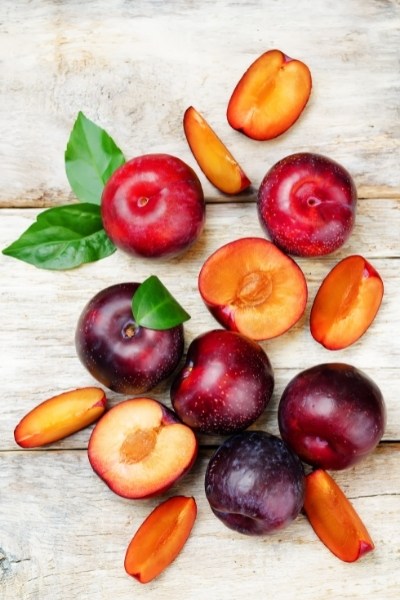
Unfortunately, fresh plums aren't as high in vitamin K as dried plums are, so to reap those benefits, reach for prunes.
Both fresh and dried plums (prunes) are rich in antioxidants. They protect our cells from the damage caused by free radicals, and they also remove them from our systems.
In addition, antioxidants present in plums help maintain healthy bones and joints.
- RELATED: Are Grapes Acidic? (What's their pH?)
These compounds also give plums anti-inflammatory properties, helping in lung and heart disease prevention. Antioxidants also help in preventing certain types of cancers.
Even though plums are filled with sugar, they don't appear to cause a rise in blood glucose levels. As a result, this fruit helps in maintaining stable glucose levels, controlling diabetes.
In addition, the fiber included in plums helps control blood sugar as well since it improves metabolism and hydration.
The only important thing to remember when eating plums for this health benefit is to control your portion size as this fruit is rich in calories.
Are plums bad for acid reflux?
Plums are an acidic fruit, making them a bad choice for people with GERD and other stomach issues.
Acidic foods cause a rise in gastric acid production, causing the acid to go up to your esophagus and trigger acid reflux and heartburn.
As a result, people experiencing these symptoms regularly should avoid eating plums and other food containing plums, such as juices, cakes, and pies.
In addition, plums are loaded with sugar. Sugary foods often contribute to excessive gastric acid production since our stomachs need more acid to digest sugar.
Out of 8 grams of carbs, sugar makes up for 7 grams in plums, making this fruit very sugary.
Sugar alone doesn't cause acid reflux, but the sugar found in the so-called trigger foods, such as plums and prunes, can worsen those symptoms.
This is because fructose mixed with the fruit's acidity leads to stomach issues.
Which plum variety is more acidic?
Just as with most fruits and vegetables, different varieties of plums have different pH levels. For example, blue plums are more acidic, ranging between 2.8-3.4, while red plums range between 3.6.-4.3.
This is often because red plums are riper than their blue counterparts, decreasing their acidity level.
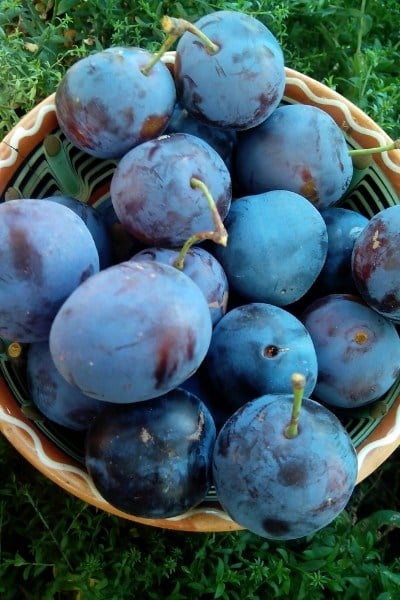
Nevertheless, both of these varieties are acidic and should be avoided by people particularly sensitive to excessive gastric acid production.
Similarly, yellow plums tend to be sweeter and have a pH level of around 4.8. However, they're still considered acidic and may not be suitable for people with stomach issues.
Yellow plums are a special variety that differs from blue and red plums, so the pH levels differ as well.
Nevertheless, all plums are acidic and should be consumed carefully by people with GERD.
Even though they differ in pH level, all of these varieties have the same effect on GERD, heartburn, and acid reflux.
Red plums are simply sweeter, which masks their acidity, but it doesn't change their molecular makeup. As a result, it's best to be careful with sweet plums and sweet fruit in general.
Are dried plums (prunes) acidic?
Dried plums, also called prunes, have a similar pH range to fresh plums: 3.6-3.9. Therefore, everyone struggling with stomach issues should be careful when consuming them not to aggravate their symptoms.
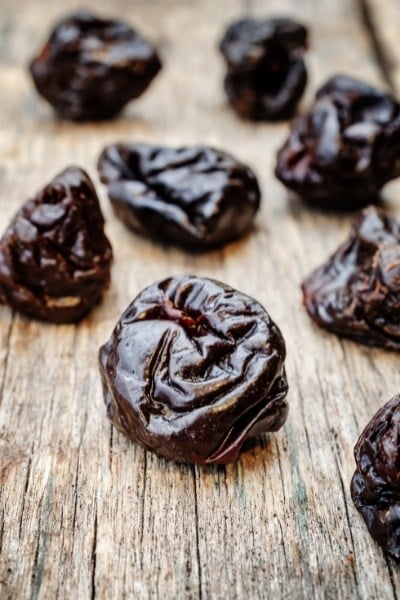
Dried plums also have higher sugar content, causing an even higher gastric acid production after eating them.
However, prunes are very healthy and contain higher levels of vitamins and nutrients than fresh plums.
For instance, prunes have nearly three times as much vitamin K as fresh plums do. They're also richer in vitamin B, which promotes cell growth and blood cell production.
Prune juice is also incredibly healthy for digestion and may relieve constipation in many people.
Plums are one of the more acidic fruit. They're also very sugary, making them bad for people with severe GERD, acid reflux, and heartburn.
However, some people with these conditions tolerate this fruit — as with everything, it's very personal and depends on many factors.
So, if you can eat plums without worsening your symptoms, it might be worth including a small portion in your diet and getting the health benefits.
Don't know what to drink? Check out these articles: 20 Most and Least Acidic Juices and 20+ Alcoholic Drinks Ranked by Acidity Level
